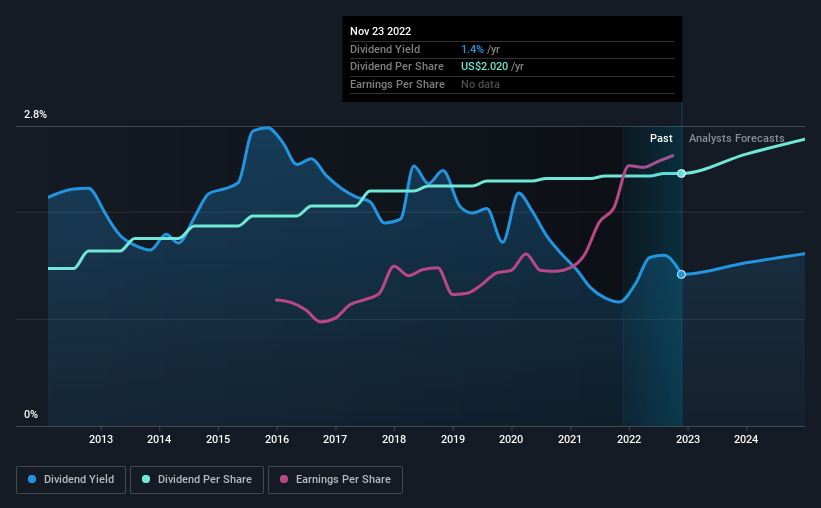Is It Smart To Buy Dover Corporation (NYSE:DOV) Before It Goes Ex-Dividend?
Dover Corporation (NYSE:DOV) is about to trade ex-dividend in the next four days. Typically, the ex-dividend date is one business day before the record date which is the date on which a company determines the shareholders eligible to receive a dividend. The ex-dividend date is important because any transaction on a stock needs to have been settled before the record date in order to be eligible for a dividend. In other words, investors can purchase Dover's shares before the 29th of November in order to be eligible for the dividend, which will be paid on the 15th of December.
The company's next dividend payment will be US$0.51 per share. Last year, in total, the company distributed US$2.02 to shareholders. Based on the last year's worth of payments, Dover has a trailing yield of 1.4% on the current stock price of $142.76. Dividends are a major contributor to investment returns for long term holders, but only if the dividend continues to be paid. That's why we should always check whether the dividend payments appear sustainable, and if the company is growing.
See our latest analysis for Dover
Dividends are usually paid out of company profits, so if a company pays out more than it earned then its dividend is usually at greater risk of being cut. Dover has a low and conservative payout ratio of just 25% of its income after tax. A useful secondary check can be to evaluate whether Dover generated enough free cash flow to afford its dividend. It distributed 50% of its free cash flow as dividends, a comfortable payout level for most companies.
It's positive to see that Dover's dividend is covered by both profits and cash flow, since this is generally a sign that the dividend is sustainable, and a lower payout ratio usually suggests a greater margin of safety before the dividend gets cut.
Click here to see the company's payout ratio, plus analyst estimates of its future dividends.
Have Earnings And Dividends Been Growing?
Businesses with strong growth prospects usually make the best dividend payers, because it's easier to grow dividends when earnings per share are improving. Investors love dividends, so if earnings fall and the dividend is reduced, expect a stock to be sold off heavily at the same time. It's encouraging to see Dover has grown its earnings rapidly, up 21% a year for the past five years. Earnings per share have been growing very quickly, and the company is paying out a relatively low percentage of its profit and cash flow. This is a very favourable combination that can often lead to the dividend multiplying over the long term, if earnings grow and the company pays out a higher percentage of its earnings.
Another key way to measure a company's dividend prospects is by measuring its historical rate of dividend growth. Dover has delivered 4.8% dividend growth per year on average over the past 10 years. It's good to see both earnings and the dividend have improved - although the former has been rising much quicker than the latter, possibly due to the company reinvesting more of its profits in growth.
To Sum It Up
Should investors buy Dover for the upcoming dividend? Dover has been growing earnings at a rapid rate, and has a conservatively low payout ratio, implying that it is reinvesting heavily in its business; a sterling combination. Dover looks solid on this analysis overall, and we'd definitely consider investigating it more closely.
In light of that, while Dover has an appealing dividend, it's worth knowing the risks involved with this stock. For example, we've found 2 warning signs for Dover that we recommend you consider before investing in the business.
If you're in the market for strong dividend payers, we recommend checking our selection of top dividend stocks.
Have feedback on this article? Concerned about the content? Get in touch with us directly. Alternatively, email editorial-team (at) simplywallst.com.
This article by Simply Wall St is general in nature. We provide commentary based on historical data and analyst forecasts only using an unbiased methodology and our articles are not intended to be financial advice. It does not constitute a recommendation to buy or sell any stock, and does not take account of your objectives, or your financial situation. We aim to bring you long-term focused analysis driven by fundamental data. Note that our analysis may not factor in the latest price-sensitive company announcements or qualitative material. Simply Wall St has no position in any stocks mentioned.
Join A Paid User Research Session
You’ll receive a US$30 Amazon Gift card for 1 hour of your time while helping us build better investing tools for the individual investors like yourself. Sign up here

 Yahoo Finance
Yahoo Finance 
